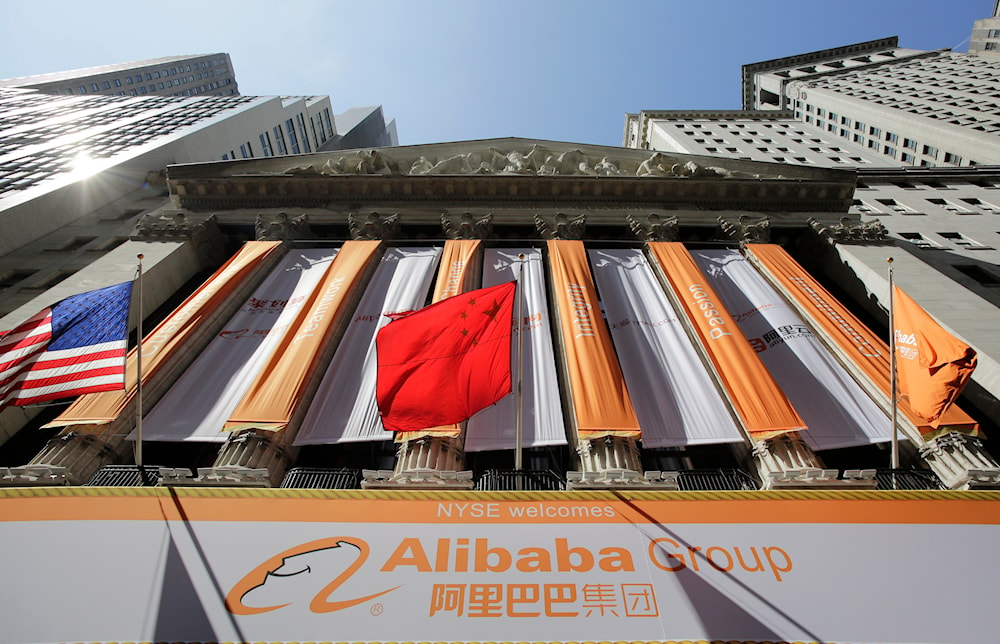Chinese ecommerce giants pivot to domestic market amid US tariffs: FT
Alibaba, JD.com, and Pinduoduo are launching major domestic initiatives to support exporters hit by US tariffs, as Chinese tech firms shift focus to stabilize the economy amid the escalating trade war.
-

A Chinese flag, center, waves over a banner for Alibaba on the New York Stock Exchange, on September 19, 2014, in New York. (AP)
A Financial Times (FT) report on Saturday revealed that China’s leading e-commerce platforms, Alibaba, JD.com, and Pinduoduo, are rolling out multibillion-dollar domestic initiatives to support traditional exporters, as Beijing pushes to shield the economy from the growing impact of US tariffs.
The report detailed that the strategic pivot comes amid escalating trade tensions and a national campaign to reroute export-driven businesses toward the domestic market.
Alibaba leads efforts to shift exporters to domestic sales
Alibaba has formed a special task force to identify and source products from exporters across more than 10 Chinese provinces. Through its e-commerce platforms Taobao and Tmall, the company is offering increased commissions and enhanced visibility to attract at least 10,000 exporters and help market 100,000 items to Chinese consumers.
The report explained that Alibaba's supermarket chain, Freshippo, has also established "green channels" to fast-track the placement of export-grade products on store shelves, marking a strong commitment to supporting domestic consumption.
In response to new US trade measures, Pinduoduo has pledged to invest RMB 100 billion (approximately $13.7 billion) to help sellers refocus their business models, according to FT.
“We are determined to shoulder the costs and risks and to navigate the uncertainties in the external market environment,” said Zhao Jiazhen, co-CEO of Pinduoduo. He emphasized that the company would prioritize the stable growth and profitability of small and medium-sized manufacturers.
The US decision to cancel duty exemptions on shipments under $800, coupled with a 125% tariff on many goods from China, has rendered exports for many sellers financially unsustainable.
JD.com and Tencent join push to support local manufacturers
Additionally, JD.com announced a RMB 200 billion (around $27 billion) fund aimed at procuring products from local exporters over the next year. The fund is part of the broader movement among China’s e-commerce platforms to counteract trade disruptions and protect domestic producers, according to FT.
The FT report detailed that other tech giants have launched similar programs. ByteDance, which owns TikTok and Douyin, is joining efforts to promote domestic brands, while Baidu pledged to allow one million companies to advertise in its livestreams using AI-generated "virtual humans" for free, enhancing exposure for struggling exporters.
Ride-hailing firm DiDi announced a RMB 2 billion investment to “stabilize employment and boost consumption,” while also supporting domestic manufacturers in expanding their reach, both locally and globally.
Government encourages private sector alignment
China’s Ministry of Commerce recently held meetings with trade associations, distributors, and retail chains to explore domestic alternatives for exporters affected by the trade war. During a meeting attended by Vice Minister Sheng Qiuping, officials pledged to assist businesses in weathering what they called an “external shock.”
According to FT, the shift also reflects Beijing’s changing tone toward the tech industry. President Xi Jinping recently met with key entrepreneurs, including Alibaba’s Jack Ma, Tencent’s Pony Ma, and Meituan’s Wan Xing. The meeting was widely seen as a signal that the sector is regaining official favor after years of regulatory tightening.
Industry analysts suggest political considerations and public sentiment are motivating Chinese tech giants to step up. Li Chengdong, founder of the e-commerce consultancy Haitun, said companies are acting out of a sense of "anti-US unity" and public responsibility.
“Political sensitivity is high enough that no formal directives are needed,” said Li, "Consumers are also watching closely. These companies must balance commercial strategy with public perception.”
Recent trends also point to a rise in patriotic consumer behavior, according to FT, as well as state-directed support for Chinese stock markets through investment by state-owned funds and corporate share buybacks.

 4 Min Read
4 Min Read








